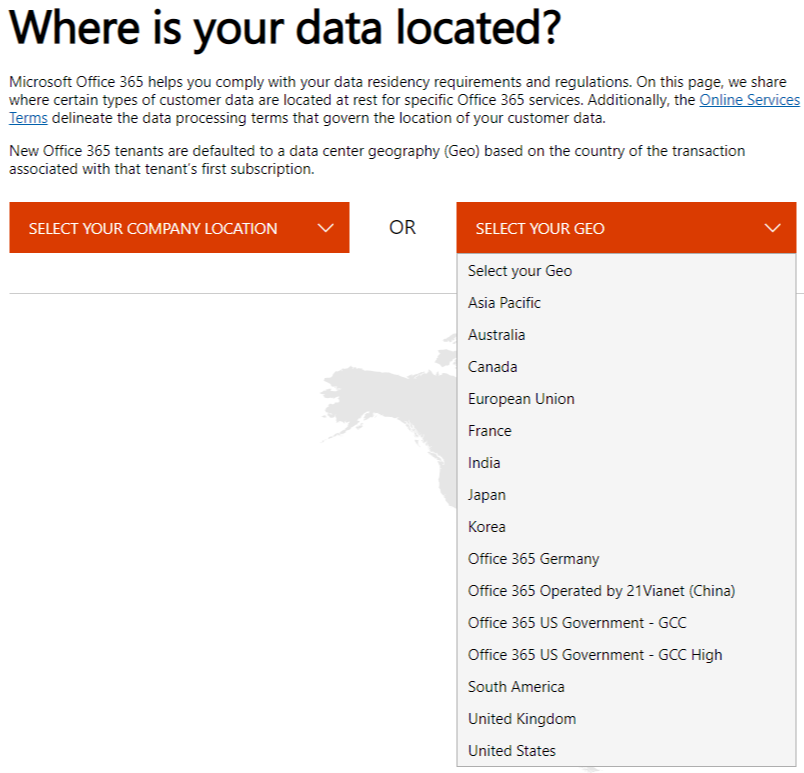Dynamics CRM Online is hosted at various locations around the world. Preview organizations can be created in all available locations, but features and updates are typically rolled out on a schedule, which is faster in some locations than others.
The format of the Dynamics CRM Online Organization URL describes the data center location. As such, the standard format is https://OrganizationName.crm[x].dynamics.com.
The OrganizationName phrase is the name you have selected for your online organization. This is customizable and is validated for uniqueness within the respective data center.
The [x] represents a number. At the time of writing, this number can be anywhere between 2, 4, 5, 6, 7, 9, or no number at all. This describes the global data center that is used to host your organization.
Microsoft has chosen to disclose the locations of data centers used on the Office 365 site. The following screenshot shows the available locations at the time of writing:

New data centers are being added on a regular basis. Some of the drivers behind adding these new data centers revolve around not only performance improvements, as a data center located closer to a customer will theoretically provide a better performance, but also a need for privacy and localization of data. Strict legislation around data residency has a great impact on the selection of the deployment model by customers who are bound to store all data locally to the country of operation.
These data centers share services between Dynamics 365 Online and other services, such as Azure and Office 365.
Advantages of choosing Dynamics 365 Online
The decision to select one hosting model over another for Dynamics 365 is typically driven by a multitude of factors, including, but not limited to, the following:
- The better feature set
- Financially backed uptime guarantee
- Extended compliance
- Scalability
- Time to market
- Integration with other online services
Over the last few years, there has been a huge increase in reliance on the cloud. Microsoft has been very focused on enhancing its Online offering and has continued to devote more functionality and more resources to support the cloud model. As such, Dynamics 365 Online has become a force to reckon with. It is hosted on a very modern and high-performing infrastructure. Microsoft has invested literally billions of dollars in new data centers and infrastructure. This allows new customers to forego the necessary expenses for infrastructure associated with an on-premise deployment.
Along with investments in infrastructure, the service-level agreement (SLA) offered by Dynamics 365 Online is financially backed by Microsoft. Depending on the service selected, the uptime is guaranteed and backed financially. Application and infrastructure are automatically handled for you by Microsoft, so you don't have to retain staff to handle these functions. This translates to much lower upfront costs, as well as reduced costs for ongoing maintenance and upgrades.
The Dynamics 365 Online offering is also compliant with various regulatory requirements and backed and verified through various third-party tests. Rules, regulations, and policies in various locales are validated and certified by global and local organizations. Some of the various compliance policies that are evaluated include, but are not limited to, the following:
- Data privacy and confidentiality policies
- Data classification
- Information security
- Privacy
- Data stewardship
- Secure infrastructure
- Identity and access control
All these compliance requirements conform to regulations stipulated by the International Standard Organization (ISO) and other international and local standards. Independent auditors validate standards compliance. Microsoft is ISO 27001 certified.
Furthermore, choosing the cloud over a standard on-premises deployment offers other advantages around scalability, faster time to market, and higher value proposition.
In addition to the standard benefits of an Online deployment, one other great advantage is the ability to spin-up a 30-day trial instance of Dynamics 365 Online and convert it to a paid instance only when you are ready to go to production. This allows customizers and companies to get started and customize their solution in a free environment, with no additional costs attached. The 30-day trial instance gives us a 25-day license instance that allows us to not only customize the Organization, but also test various roles and restrictions.
In the next section, we will learn about the prerequisites needed to customize Dynamics CRM.



